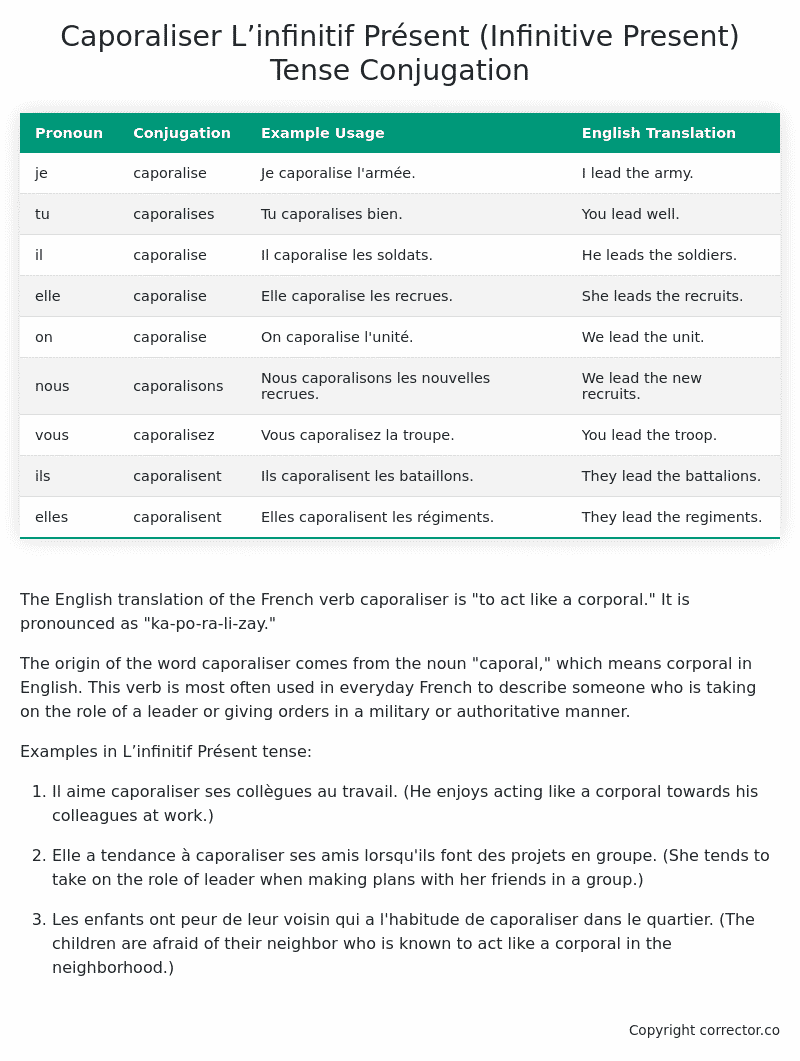L’infinitif Présent (Infinitive Present) Tense Conjugation of the French Verb caporaliser
Introduction to the verb caporaliser
The English translation of the French verb caporaliser is “to act like a corporal.” It is pronounced as “ka-po-ra-li-zay.”
The origin of the word caporaliser comes from the noun “caporal,” which means corporal in English. This verb is most often used in everyday French to describe someone who is taking on the role of a leader or giving orders in a military or authoritative manner.
Examples in L’infinitif Présent tense:
-
Il aime caporaliser ses collègues au travail. (He enjoys acting like a corporal towards his colleagues at work.)
-
Elle a tendance à caporaliser ses amis lorsqu’ils font des projets en groupe. (She tends to take on the role of leader when making plans with her friends in a group.)
-
Les enfants ont peur de leur voisin qui a l’habitude de caporaliser dans le quartier. (The children are afraid of their neighbor who is known to act like a corporal in the neighborhood.)
Table of the L’infinitif Présent (Infinitive Present) Tense Conjugation of caporaliser
| Pronoun | Conjugation | Example Usage | English Translation |
|---|---|---|---|
| je | caporalise | Je caporalise l’armée. | I lead the army. |
| tu | caporalises | Tu caporalises bien. | You lead well. |
| il | caporalise | Il caporalise les soldats. | He leads the soldiers. |
| elle | caporalise | Elle caporalise les recrues. | She leads the recruits. |
| on | caporalise | On caporalise l’unité. | We lead the unit. |
| nous | caporalisons | Nous caporalisons les nouvelles recrues. | We lead the new recruits. |
| vous | caporalisez | Vous caporalisez la troupe. | You lead the troop. |
| ils | caporalisent | Ils caporalisent les bataillons. | They lead the battalions. |
| elles | caporalisent | Elles caporalisent les régiments. | They lead the regiments. |
Other Conjugations for Caporaliser.
Le Present (Present Tense) Conjugation of the French Verb caporaliser
Imparfait (Imperfect) Tense Conjugation of the French Verb caporaliser
Passé Simple (Simple Past) Tense Conjugation of the French Verb caporaliser
Passé Composé (Present Perfect) Tense Conjugation of the French Verb caporaliser
Futur Simple (Simple Future) Tense Conjugation of the French Verb caporaliser
Futur Proche (Near Future) Tense Conjugation of the French Verb caporaliser
Plus-que-parfait (Pluperfect) Tense Conjugation of the French Verb caporaliser
Passé Antérieur (Past Anterior) Tense Conjugation of the French Verb caporaliser
Futur Antérieur (Future Anterior) Tense Conjugation of the French Verb caporaliser
Subjonctif Présent (Subjunctive Present) Tense Conjugation of the French Verb caporaliser
Subjonctif Passé (Subjunctive Past) Tense Conjugation of the French Verb caporaliser
Subjonctif Imparfait (Subjunctive Imperfect) Tense Conjugation of the French Verb caporaliser
Conditionnel Présent (Conditional Present) Tense Conjugation of the French Verb caporaliser
Conditionnel Passé (Conditional Past) Tense Conjugation of the French Verb caporaliser
L’impératif Présent (Imperative Present) Tense Conjugation of the French Verb caporaliser
L’infinitif Présent (Infinitive Present) Tense Conjugation of the French Verb caporaliser (this article)
Struggling with French verbs or the language in general? Why not use our free French Grammar Checker – no registration required!
Get a FREE Download Study Sheet of this Conjugation 🔥
Simply right click the image below, click “save image” and get your free reference for the caporaliser L’infinitif Présent tense conjugation!

Caporaliser – About the French L’infinitif Présent (Infinitive Present) Tense
Forming the Infinitive Present
Common Everyday Usage Patterns
As a Verb’s Dictionary Form
After Modal Verbs
As an Imperative
In Infinitive Clauses
Interactions with Other Tenses
Present Tense
Future Tense
Conditional Tense
Passé Composé
Imperfect Tense
Subjunctive and Conditional Moods
Summary
Want More?
I hope you enjoyed this article on the verb caporaliser. Still in a learning mood? Check out another TOTALLY random French verb conjugation!


